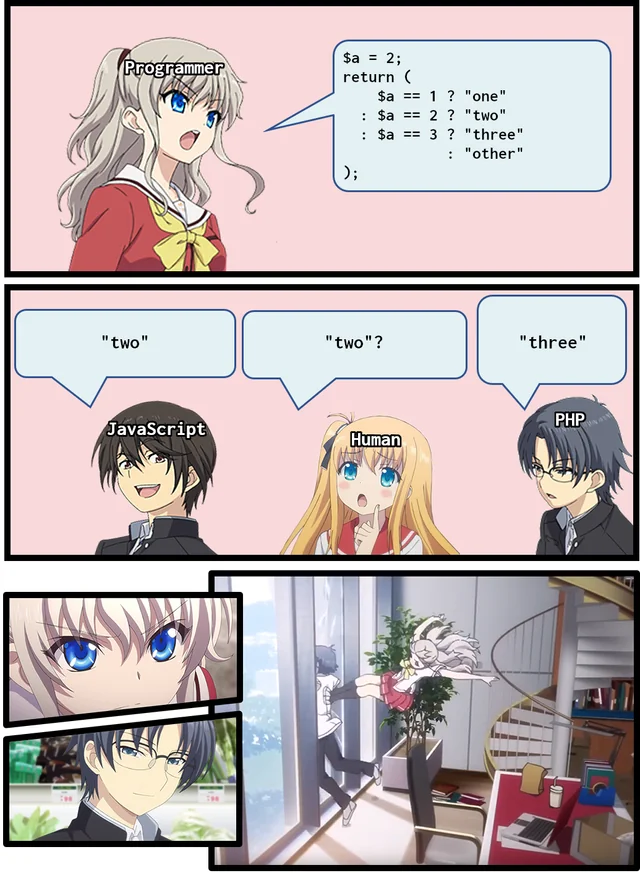this post was submitted on 14 Jul 2023
363 points (90.4% liked)
Programmer Humor
32710 readers
700 users here now
Post funny things about programming here! (Or just rant about your favourite programming language.)
Rules:
- Posts must be relevant to programming, programmers, or computer science.
- No NSFW content.
- Jokes must be in good taste. No hate speech, bigotry, etc.
founded 5 years ago
MODERATORS
you are viewing a single comment's thread
view the rest of the comments
view the rest of the comments

To be fair: If you are chaining ternary expressions, you deserve to suffer whatever pain the language happens to inflict upon you tenfold.
Why?
It's perfectly readable.
It is sort of readable. A switch is "perfectly" readable for switching.
Match is even better, short and sweet.
Ternary expressions aren't switches though
Which is exactly why you shouldn't be using them in a situation that clearly calls for a switch.
In the given example I'd probably use a switch / match expression, but ternaries are usually more flexible than switches and I don't think it's an issue to write a nested ternary instead of if else statements.
Which is bad for readability because the reader need to manually compute it to see whether it's doing simple switching or not. Also it adds the question of "Why did the author use a nested ternary instead of a switch? Was it meant to do more but it got left out unintentionally?"
Yes, you need to read code to understand it. If else statements can also do the job of a switch, so the exact same argument applies.
The point is I don't need to read a switch statement to know that it is a switch
There is usually a safer and more readable way to do what you want to do by chaining ternaries in most languages.
How is it unsafe?
Well, if you assume ternary operations work the same in PHP as in c and attempted to write the code demoed by this meme. You would end up with unexpected behavior. Maybe I should have said unexpected behavior instead of unsafe behavior.
PHP is the only language in existence with a left associative ternary operator. Ignoring PHP, the operator has worked exactly the same way for decades. And even PHP has now fixed the operator.
I don't think it's reasonable to avoid a very commonly supported pattern just because a single badly designed language implemented it wrong.
Okay, even if I give you the unexpected behavior point. The readability problem remains. Switch statements or tables will work just fine and are easier to read.
To be clear, I am fine with single ternary operations. I think nested ternary operations are harder to read and follow.
I agree you should use a switch where applicable, but ternaries are the expression equivalent of if-else statements. If I have two conditions and a default, and each branch simply evaluates to a value of the same type, I'll probably just use a ternary.